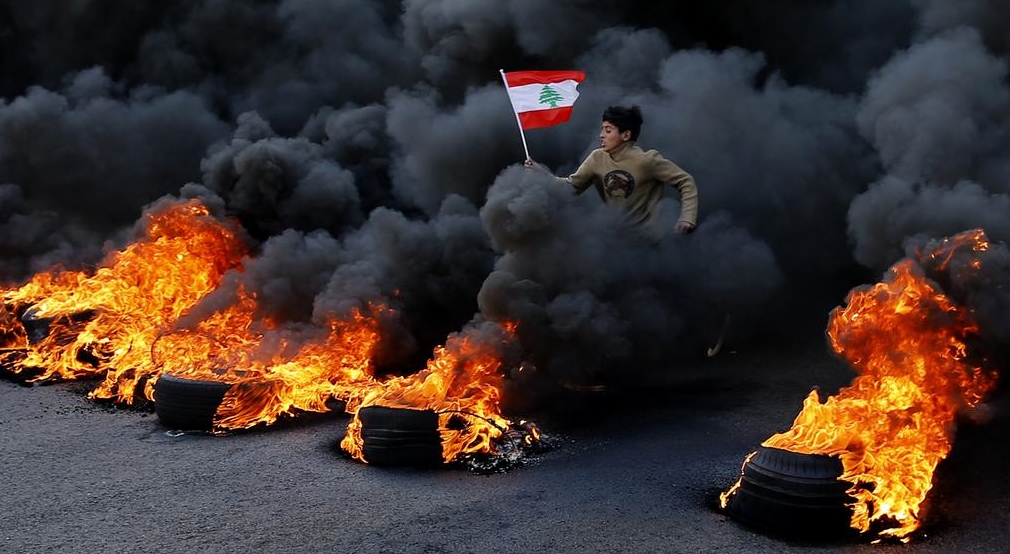For the past two decades, February 14Â has marked a moment of reflection for many in Lebanon, the anniversary of the 2005 car bomb attack that killed the former Prime Minister Rafik Hariri, and finally led to the end of Syrian occupation.
This year the date was more poignant because his son Saad, who subsequently took on his father’s leadership of parts of the Sunni community, announced his withdrawal from politics.
In his resignation address, Hariri sounded a pessimistic note. “I am convinced that there is no room for any positive opportunity for Lebanon in light of Iranian influence, national division and the withering of the state,” he said. He told members of parliament he expected the situation to get worse, and advised the Future Movement, of which he was leader, not to contest elections this year. All in all, a pessimistic political outlook.
The economic outlook is similarly grave. Despite last week’s approval of a government budget, the economy is in full meltdown, with the Lebanese pound having lost more than 90 percent of its value. Poverty is widespread and many Lebanese have seen their savings wiped out; others are frozen out of bank accounts.
With so much on a downward trajectory in the country, it is little wonder that the descriptor “failed state” has once again made the rounds, sometimes even by those within the country. But while catchy, it is lazy and platitudinous – nor even very helpful. There are usually four ways analysts decide if a state has failed, summed up as: Borders, utilities, guns and government.
Can a state protect its borders; can it provide basic utilities and services; can it govern people across its territory, and does it have a monopoly on the use of force?
The last is often seen as the most important. States that cannot police themselves, where there are groups within their territory that can arrest, imprison and even kill citizens who are not part of the state are usually candidates for failed states.
Judged like that, Lebanon could certainly qualify as a failed state: There is no monopoly on the use of violence, as Hezbollah’s vast military resources sit outside of state control. But the same is true in many other countries. Ukraine has part of its territory in Crimea occupied. Many countries across the Sahel don’t control their borders.
In truth, many of the countries called failed states over the past few years – Syria, Afghanistan, Yemen – had not disintegrated to the point where the state could no longer function. Indeed, in Syria, even though parts of the country were beyond the regime’s control, there was never a point in the past 10 years when the authorities in Damascus could not control parts of their territory and population – and, tragically, still order the military to carry out attacks. If Syria was a failed state, many Syrians might mutter darkly that it wasn’t failed enough.
The archetypal failed state – the one for which the designation was created and the only one to which it could reasonably be applied – was Somalia in the 1990s. After a coup toppled the dictator Siad Barre in 1991, rival militias turned on each other, then on humanitarian workers, then on the United States. Two decades would pass before a centralized government resumed.
Apart from the obvious criticism that the designation “failed state” is inherently political, it is also not especially helpful. Is Lebanon on a precipice, socially, politically and economically? Undoubtedly. But designating the country a failed state is really a rhetorical act; it does nothing to change the facts on the ground, nor the way the international community responds. It may, I suppose, provoke urgency – although it hasn’t so far. If it’s not accurate to describe Lebanon as a failed state, it may still be right to say it has failed as a state.
That is to say that while the idea of Lebanon as a multi-confessional society remains accurate, the political construction of that state is problematic. It’s this wrapper of a political structure, a sectarian structure put in place in 1990 after the civil war, that has caused many of today’s problems. It isn’t unreasonable to say that that particular method of organizing the state has failed.
The reason is apparent to anyone who has looked at Lebanon’s history since the Taif agreement that ended the conflict. For decades, the sectarian system has ensured that no national identity could emerge. Instead, Lebanon’s political development was frozen along religious lines, and anyone who questioned that system was bullied by threats of a return to civil war.
That certainly was the conclusion of the mass protests that started in 2019, led by a new generation eager to sweep away the sectarian system. It is a shame that, three years on, that movement is still spluttering and hasn’t been given the support – within and without Lebanon’s borders – that it deserves.
It isn’t obvious what the consequences of Hariri’s withdrawal from public life, and his public declaration that he has no faith in the elections, may be, but they are unlikely to be as far reaching as he would like – at least on the evidence of the past two years.
Life in Lebanon is certainly on a precipice. These are dark days for the country. But if Lebanon is failing, it is because the state has failed it.

By Faisal Al Yafai is currently writing a book on the Middle East and is a frequent commentator on international TV news networks. He has worked for news outlets such as The Guardian and the BBC, and reported on the Middle East, Eastern Europe, Asia and Africa.
This article was produced by Syndication to publish on Telegraf.





